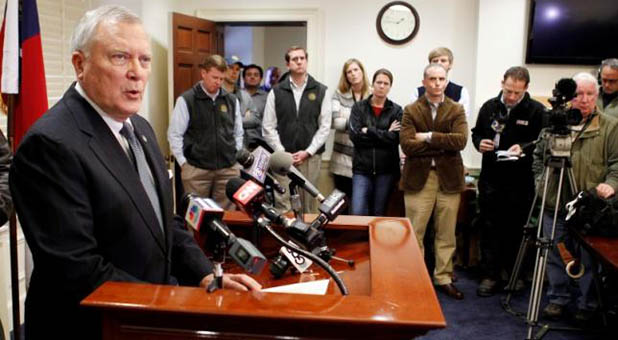LGBT Pressure Too Much for Georgia’s Governor
When faced with a decision between defending the religious freedom of Christians in the wake of the U.S. Supreme Court opinion in Obergefell v. Hodges and a potential financial boycott of his state, Georgia Gov. Nathan Deal said he was taking a stand against discrimination.
Just not the discrimination that House Bill 757 would have protected against. He announced Monday morning at a press conference that he will veto the legislation, alternatively known as the Pastor Protection Act and the Religious Freedom Protection Act.
His argument in shooting down the legislation was that it sanctioned discrimination in order to protect Georgia Christians from issues that have never occurred in that state:
“I do not think we have to discriminate against anyone to protect the faith-based community in Georgia of which my family and I are a part of for all of our lives. Our actions on HB 757 are not just about protecting the faith-based community or providing a business-friendly climate for job growth in Georgia. This is about the character of our State and the character of its people.
“Georgia is a welcoming state filled with warm, friendly and loving people. Our cities and countryside are populated with people who worship God in a myriad of ways and in very diverse settings. Our people work side-by-side without regard to the color of our skin, or the religion we adhere to.
“We are working to make life better for our families and our communities. That is the character of Georgia. I intend to do my part to keep it that way.”
Deal said could find no examples that “any of the things this bill seeks to protect us against” have ever happened in Georgia. He said cases from other states cited by supporters of HB 757 came from states that had established “sexual orientation” as a protected class in their anti-discrimination laws.
“Georgia has no such statues,” he said.
The Governor’s Office was flooded with “hundreds of thousands” of phone calls from those both in favor and opposed to the legislation. Deal didn’t directly address those calls, but he did address those who questioned his character and businesses that threatened to boycott his state.
“Some of those in the religious community who support this bill have resorted to insults that question my moral convictions and my character,” he said. “Some within the business community who oppose this bill have resorted to threats of withdrawing jobs from our state. I do not respond well to insults or threats.”
But the argument remains that he eventually gave opponents of the bill—those who threatened the boycott—exactly what they wanted. Coca-Cola, which is headquartered in Atlanta; the NFL, which is considering Atlanta for a Super Bowl in 2019 or 2020; and several Hollywood studios, which provide thousands of jobs and pump billions of dollars of revenue into the state, were all involved in the threat to boycott Georgia.
The calls for boycott, however, were launched by the Human Rights Campaign. Its website how leads with the following headline, in large, bold letters:
“FOLLOWING BACKLASH FROM ACROSS THE COUNTRY, GEORGIA GOV. WILL VETO DISCRIMINATORY ANTI-LGBT BILL—VICTORY IN GEORGIA!”
The organization’s president, Chad Griffin, released the following statement after Deal’s press conference had concluded:
“The message to Governor Nathan Deal was loud and clear: this deplorable legislation was bad for his constituents, bad for business, and bad for Georgia’s future. Discrimination and intolerance have no place in the 21st century, and any town, city or state that enshrines it into law will not be judged kindly by history or by the American public. Thankfully, Governor Deal listened to the voices of Georgians, civil rights organizations, as well as the many leaders in the entertainment industry and in the private sector who strongly condemned this deplorable attack on the fundamental civil rights of LGBT people. We hope North Carolina’s Governor and General Assembly are paying close attention to what has transpired in Georgia, and that they undo their disgraceful attack on LGBT people in the state’s upcoming legislative session.”
HRC is already stepping up the pressure on Georgia, demanding the state now enact legislation to establish “sexual orientation” as a protected class in its anti-discrimination laws, or face the loss of its burgeoning movie-production industry.
















































